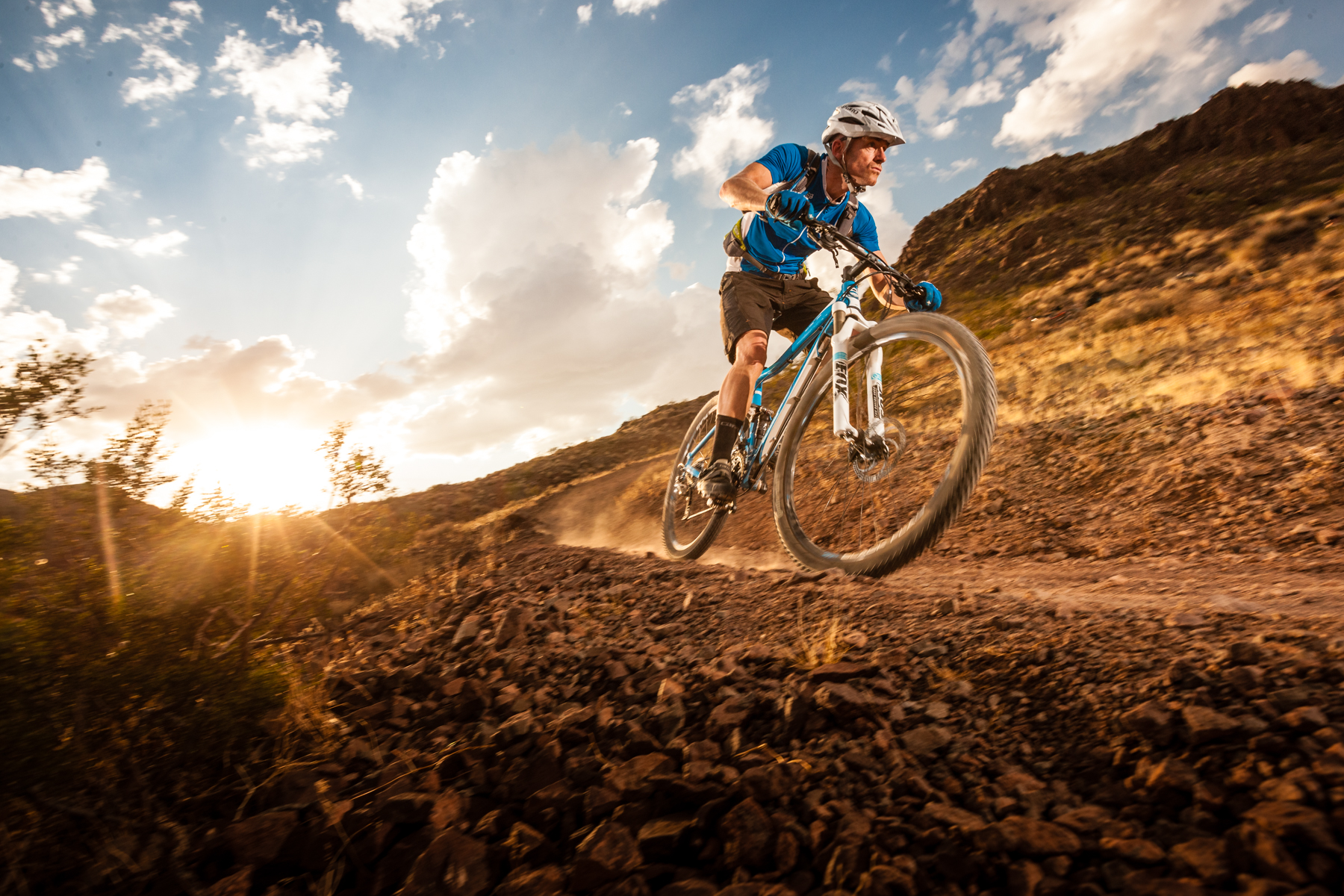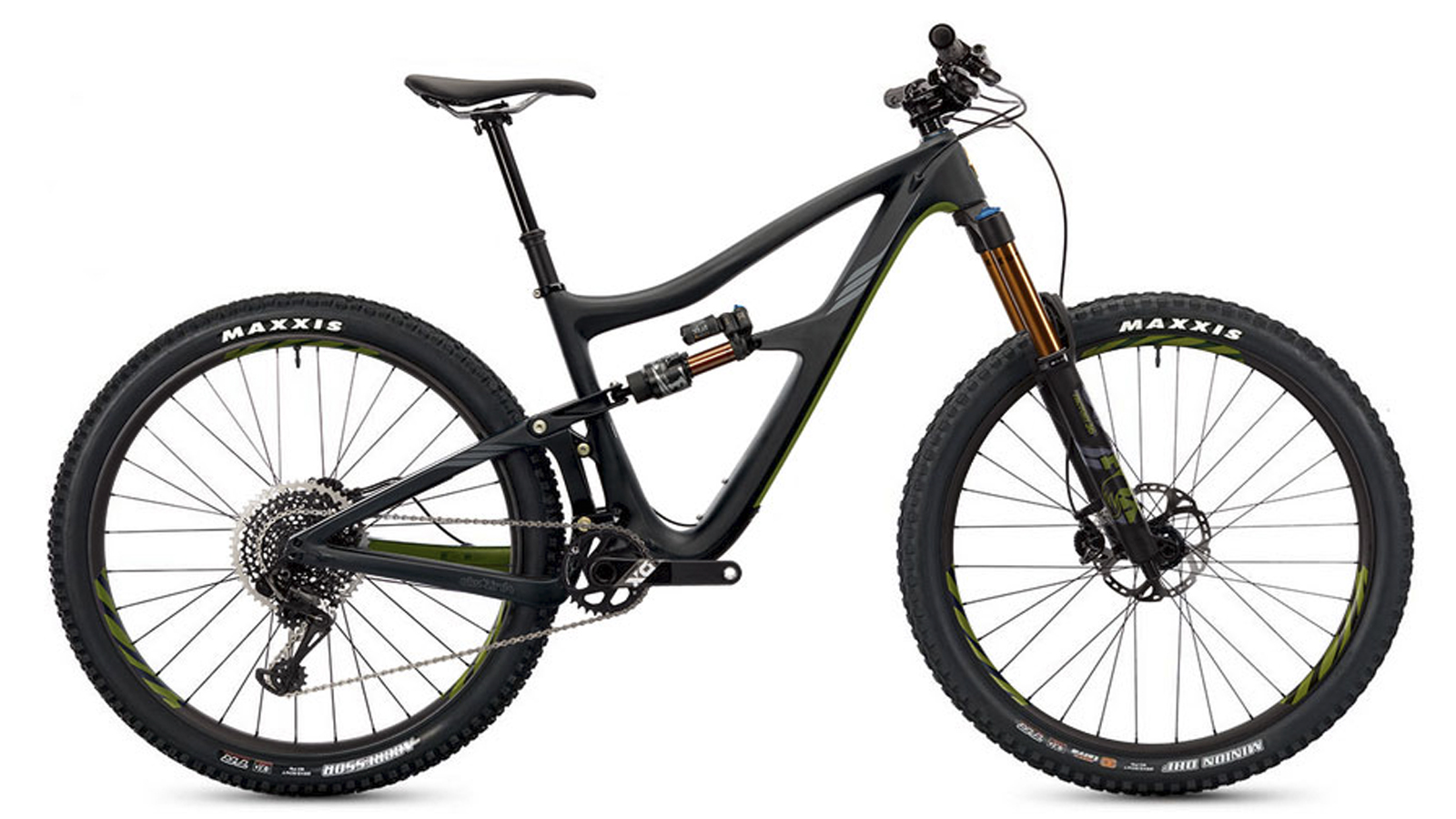Bike Perfect Verdict
A precision tool for those looking for improved, negative-vert confidence
Pros
- +
Lightweight, super tight frame and suspension feel for power multiplication and precision
- +
Aggressive seat angle translates into insane traction on the steepest challenge climbs
Cons
- -
Premium brand means high cost and standard shock has limited tuning
- -
Suspension struggles between chattery start and sudden blow through on DH trails
Why trust BikePerfect
Ibis Cycles is one of the original Californian MTB brands and its bikes have always been stylish, innovative, and super efficient for climbing. Now its amped up the rad in terms of geometry too, so where in the big-travel, big-wheeled rankings does the Ripmo sit and who does it suit best?
Design and geometry
Ibis dropped jaws with the flowing composite lines of its Mojo when it relaunched in 2004/5 and there’s still a lot of that much copied organic look in the Ripmo. Ibis have been using custom versions of Dave Weagle’s twin-link DW Link suspension system since then, too. While the current architecture isn’t as elaborately pocketed and flush fitted as the original bikes there’s still devils in the detail as the Ripmo uses solid state Igus bushings not cartridge bearings in the main pivots. Ibis reasoning being that they’re a lighter, tougher, axially stiffer solution to limited rotation pivot movement. The frames are hand reamed to micron tolerance and the bushings hand fitted at Ibis HQ in Santa Cruz and then sealed behind airtight shields. The bushings are also lifetime warrantied and the back end moves pretty smoothly without the shock in. Other practical touches include fully plumbed internal cable routing and a screw in not press-fit bottom bracket for easy building/servicing. The horizontal Fox DPX2 piggyback shock sits high enough to sneak a bottle underneath and there’s room for a 29 x 2.6in tyre on a 35mm rim too. Seat tubes are short enough to take long stroke droppers too, with a 175mm KS on the large size.
At around 2.5kg (depending on size) without shock, the 145mm travel frame is significantly lighter than a lot of 120mm trail bikes, let alone 150mm-ish competitors. Geometry is gravity/trail-balanced, too with a head angle just sub 66-degrees and a 76-degree seat angle (77-degrees on the small) separated by 471mm of reach on our large test bike.
Components and build
We tested the 2019 bike with an SRAM X01 spec but that’s now been replaced with an AXS version so GX is the highest priced wired SRAM group option ($5,499) or Shimano XT ($5,499). The 35mm wide carbon wheel set upgrade ($800) is still relevant though, fattening out the 2.5in Maxxis DHF/Aggressor tyre combo and allowing lower pressure running. Ibis provide the stiff 800mm carbon bars and you get a choice of Thomson stem length from 40 (yes) to 110mm (hell no).
You can also build it up from a frame to your own spec with the same option to upgrade from a Fox DPX2 to Fox X2 shock ($270). All bikes except the $9,299 XTR model come with a Performance Series version of Fox’s 36 fork, with an optional upgrade to a Factory Series fork ($290) which our sample had.
In other words - as usual for a premium brand - you’re paying a lot for the equipment you’re getting. Also while a seven-year frame and rim warranty is long for carbon, it’s not as good as the lifetime warranties offered by Yeti and Santa Cruz for similar prices. However Ibis has just introduced an alloy framed Ripmo AF with more radical geometry (64.9-degree head, 475mm reach) a DVO coil shock and complete bike pricing from $3,000 dollars.
Ride, handling and performance
With experience you can get a very clear picture of a bike immediately and even before we’d rolled far out of the loading dock at Ibis the Ripmo had clearly communicated that it’s a super-taut bike. The steep seat angle pushes the rider forward for an urgent feel over the 65.9-degree head angle and the low overall weight makes it keen to grab speed. Even in open mode the FIT4 fork feels tight off the top and that matches the bushing mounted DW Link set up at the rear.
Unsurprising then that it’s got a combative character as soon as you hit climbs and the steeper the slopes get, the more that pitched forward position and firm pedalling feel helps. Despite the low weight, the frame is conspicuously stiff when you start straining on the bars to force the pedals round too. Add broad rims that allow low tyre pressures for compliant traction plus a balanced rather than floppy front end and that all adds up to one of the best vert scrambling bikes we’ve ever ridden. To the point where we were soon begging the back wheel to slip up stupidly steep climbs just to save our lungs and legs from exploding. Giving up on altitude gain just isn’t in the Ripmo vocabulary though so if you’re prefer to ride than uplift and hate pushing or hike a biking it’s a brilliant option.
All those same tight, attentive and lightweight attributes mean it properly hustles singletrack, too, so as long as the lumps aren’t too big the Ripmo is an absolute ripper.
Once we started charging downhill through roots, rocks and drops of Campus though the Ripmo started to suffer. The back end in particular struggles to stay smooth over high-speed impact loads of any size so even small root spreads make it stutter and rattle. Once moving though it blows through the mid to deep stroke easily whether you’re hitting big drops or looking for hard cornering support. With limited opportunity to add volume spacers to the DPX2 shock (the X2 option allows more tuning) that means you have to add more pressure for a 20-25 per cent sag to bring ride height back up but that obviously impacts the small bump sensitivity further. The FIT4 fork up front was similarly uncooperative over the small stuff up front but that’s not relevant now as the 2020 models have been re-valved to be less brutal over patter bumps. We’d also be tempted to swap the bars as even though they’re only 31.8mm diameter they tend to sting not spring when the trail gets rough and your forearms soon start to fatigue as a result.
Verdict
Ibis has always produced bikes that particularly appeal to climbers and technical singletrack speedsters. Even though they’ve updated the geometry to more progressive rather than perched numbers that’s still definitely the case with the Ripmo. The back end gives plenty of feedback at slower speeds and excellent power delivery but more belligerent trails reveal an awkward mismatch between small bump clatter and bigger hit blow through. Upgrading to an X2 rear shock gives more opportunity to fix that but it’s still definitely a bike best judged by it’s 145mm of rear travel rather than the 160mm fork when it comes to overall expectations.
If you’re more likely to see crowns on your Strava feed from climbing than DH segments but you want extra travel while still improving your chances of clawing up the sickest slopes and slam dunking every summit then the Ripmo will be right up your sado-masochistic street.
Test conditions
- Temperature: 30 degrees, sunny
- Trails: Super dry and dusty Californian forest
- Terrain: Steep, black-grade climbs and descents
Tech spec: Ibis Ripmo X01 Factory
- Price: £7,399 / US$7,899 / AU$13,639
- Head angle: 65.9 degrees
- Frame material: Carbon fibre
- Size: Large
- Weight: 13.27kg
- Wheel size: 29er
- Suspension (front/rear): Fox Factory 36 FIT4 160mm travel, Fox Float DPX2 145mm travel shock.
- Drivetrain: SRAM X01 Eagle (10-50T), 32T chainset
- Brakes: Shimano XT brakes
- Wheels: Ibis 938 Carbon rims on Ibis hubs, Maxxis DHF WT 3C EXO 2.5in front tyre, Maxxis Aggressor EXO 2.5in rear tyre
- Bar/stem: Ibis Carbon 800x31.8mm bar, Thomson Elite X4 50mm stem
- Seatpost: KS Integra 175mm dropper seat post
- Saddle: Ibis custom saddle

Guy Kesteven has been working on Bike Perfect since its launch in 2019. He started writing and testing for bike mags in 1996. Since then he’s written several million words about several thousand test bikes and a ridiculous amount of riding gear. He’s also penned a handful of bike-related books and he reviews MTBs over on YouTube.
Current rides: Cervelo ZFS-5, Specialized Chisel, custom Nicolai enduro tandem, Landescape/Swallow custom gravel tandem
Height: 180cm
Weight: 69kg

